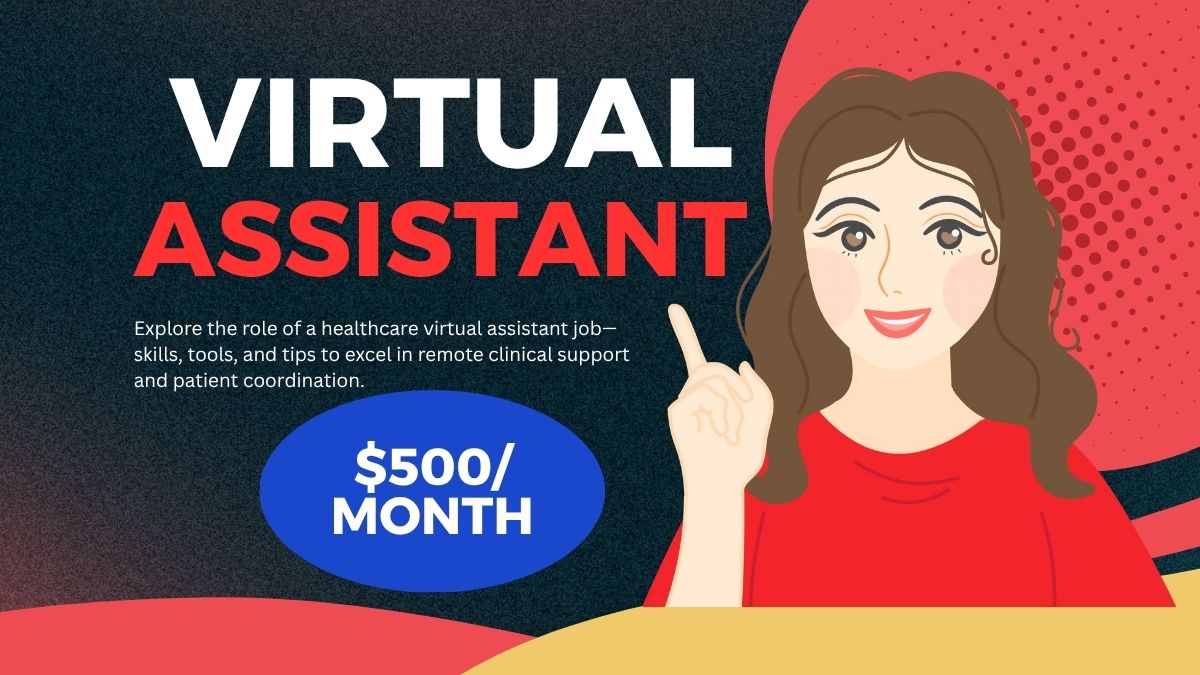In today’s fast-evolving healthcare industry, remote opportunities are becoming more common—and one of the most in-demand roles is the virtual assistant job. This position combines organization, communication, and technical skills to help healthcare teams operate smoothly. Whether you’re experienced in administrative work or just stepping into remote careers, a virtual assistant role in healthcare offers flexibility, learning, and career growth.

What Does a Virtual Assistant in Healthcare Do?
A virtual assistant job in healthcare is more than just managing calendars or emails. It involves supporting clinical operations, coordinating with patients, and ensuring that healthcare providers can focus on their core tasks.
You’ll often work with digital tools like Slack, Notion, Airtable, and AI chat systems to handle workflows efficiently. The role requires balancing administrative duties, patient interaction, and data accuracy—all while maintaining professionalism and empathy.
Key Responsibilities
Here’s what a typical virtual assistant job in healthcare includes:
- Member Support: Providing assistance to patients or members throughout their health journey—from scheduling appointments to addressing queries via chat or email.
- System Oversight: Monitoring digital platforms to ensure automation and workflows run correctly.
- Appointment Management: Coordinating lab tests, consultations, and follow-ups with clinical partners.
- Data Management: Updating databases with accurate patient information and maintaining records.
- Real-Time Issue Resolution: Handling appointment conflicts or communication breakdowns quickly and efficiently.
- Chat and Live Support: Acting as the first point of contact for patients via live chat, ensuring timely responses.
The goal is to make the healthcare experience seamless, efficient, and supportive for all members involved.
Required Skills for a Healthcare Virtual Assistant Job
To succeed in this role, you’ll need a blend of technical, communication, and problem-solving skills. Employers are looking for professionals who can manage multiple systems while maintaining a human touch in communication.
- Strong Communication Skills
Since you’ll be interacting with patients and clinicians remotely, clear English communication (both written and spoken) is essential. You must handle sensitive information with care and professionalism.
- Experience with Tools like Slack and AI
Healthcare virtual assistants frequently use collaboration platforms like Slack for internal communication and AI-driven chat systems for member engagement. Having experience with tools such as ChatGPT or Notion is a big advantage.
- Attention to Detail
Accuracy is vital when handling health data, lab appointments, or billing records. A small mistake can lead to confusion or delays.
- Critical Thinking and Initiative
You’ll often need to make quick decisions when resolving issues or updating workflows. Being proactive helps you stand out as a reliable remote worker.
- Technical Competence
A stable internet connection (at least 15 Mbps), backup devices, and a quiet workspace are essential. You’ll also need a capable computer with good processing power (e.g., Intel Core i5 or AMD Ryzen 5) to manage multiple applications smoothly.
Benefits of Working as a Virtual Assistant in Healthcare
A virtual assistant job in healthcare offers a blend of purpose, flexibility, and growth. Here are some benefits you can expect:
- Work-from-Home Flexibility
You can work remotely, avoiding daily commutes and saving valuable time. This flexibility lets you balance personal commitments while maintaining professional productivity.
- Professional Growth
You’ll collaborate with clinical and operations teams, gaining exposure to medical processes, data systems, and patient engagement tools—all of which can boost your long-term career prospects.
- Inclusive Work Culture
Many healthcare organizations foster a positive and inclusive work environment that encourages innovation, learning, and collaboration.
- Work-Life Balance
Remote work allows you to create a comfortable workspace, spend quality time with family, and maintain a healthier daily routine—something that’s especially valued in high-stress industries like healthcare.
How to Succeed in a Virtual Assistant Job
Landing a virtual assistant job is just the beginning—thriving in it requires consistency, empathy, and adaptability. Here are some tips:
- Stay Organized: Use digital project management tools to track appointments, tasks, and reports.
- Communicate Clearly: Always confirm details and follow up with concise updates.
- Learn Continuously: Stay updated with new tools like AI-powered chat systems and automation platforms.
- Be Empathetic: Remember that patients may be anxious or confused; a calm and understanding tone goes a long way.
- Collaborate Effectively: Maintain open communication with clinical and operations teams, even across time zones.
If you apply these tips, you’ll not only meet expectations but also become a valued member of any healthcare team.
Local Opportunities and Growing Demand
In countries like India and the Philippines, virtual assistant jobs are rapidly growing. Many international healthcare firms are hiring remote assistants to support their operations in the U.S. and Europe. For instance, professionals in cities like Guwahati, Manila, or Bangalore are finding remote healthcare jobs that let them contribute globally while working locally.
This global trend shows how digital healthcare is opening doors for skilled remote professionals everywhere.
Tips and Solutions: How to Apply for a Virtual Assistant Job
Getting hired for a virtual assistant job in healthcare requires more than just submitting a resume—it’s about showcasing your skills, mindset, and readiness to work remotely. Here are expert tips and solutions to help you stand out:
1. Customize Your Resume for Each Role
Use keywords from the job description such as “Slack,” “AI tools,” “live chat,” and “healthcare operations.” Tailoring your resume helps recruiters quickly see that you’re the right fit.
2. Highlight Remote Work Skills
Show that you’re comfortable with independent work, time management, and digital communication. Mention any experience with platforms like Zoom, Notion, or Trello.
3. Demonstrate Communication Skills
Strong communication is the backbone of a virtual assistant job. Include examples where you handled patient queries, managed chat systems, or coordinated across teams.
4. Build a Professional Online Presence
Update your LinkedIn profile and add “Virtual Assistant (Healthcare)” in your headline. Post short updates or articles showing your knowledge of tools like Slack or Notion.
5. Prepare for the Interview
Expect questions like:
- How do you handle patient data confidentiality?
- What steps do you take to resolve communication issues remotely?
- Can you describe a time when you used AI or automation to improve workflow?
- Prepare examples that show your initiative and technical know-how.
6. Set Up Your Workspace
Have a clean, quiet environment ready with a webcam, noise-canceling headset, and stable internet. Employers often check your setup during video interviews.
7. Stay Updated with Tools and AI Trends
Healthcare organizations are increasingly integrating AI chat systems. Learning how to use ChatGPT or other virtual tools can make your profile stronger.
Final Thoughts
A virtual assistant job in healthcare isn’t just about performing administrative tasks—it’s about making a difference in people’s health journeys. With the right mix of communication skills, AI knowledge, and organizational ability, you can build a rewarding career that combines purpose with flexibility.
Whether you’re just starting or looking to upgrade your career path, this role offers an exciting opportunity to work remotely, grow professionally, and make an impact in the healthcare world.


